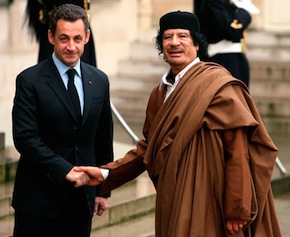So...we've decided to bomb another Muslim populated country (that being Libya, the third on the list after Iraq and Afghanistan). The US, in conjunction with coalition forces that include the United Kingdom and France, have today launched over a 100 tomahawk missles fired into cities within Libya.
Secretary of state Hilary Clinton stated in Paris today, in agreement with President Obama, that "military action is to protect civilians and is to provide access for humanitarian assistance".
Obama states, "Today we are part of a broad coilition. We are answering the calls of a threatened people. And we are acting in the interest of the US and the world." Obama has continued to repeat his stance that no US troop will be deployed on the ground.
However, If we are acting in the interest of the world and answering the call of a threatened people...why not go to Egypt? (Heck, I feel threatened paying all these taxes.Where's my stimulous package? Oh, sorry, let me get back on track...) In Egypt's attempt at overthrowing a ruthless dictator, Mubarak, the Egyptians ended up getting a government and military more ruthless than before. At least, the US now has an ally in Egypt.
The leader of Libya, Muammar Gaddafi, said Saturday that he will arm civiliaions to defend Libya from what he called "colonial, crusader agression" by western forces.
Let me ask some questions. Is our interest in Libya just for geopolitical positioning? Or is Libya a source of huge deposits of petroleum? If it's the latter, why didn't we pick other oil-rich contries like Saudia Arabia, Iran, or Oman? Or even countries like Berma?
And while we're at it, why don't we go after the natural gas-producing countries, say like...Canada? They're closer. And they have lakes and great vacation spots, not to mention some good Hockey teams. They almost became part of the US 200 years ago.
Sufice to say, this is another bad decision when it comes to foreign relations with other countries. Again, we are picking fights with a people who have difficutly defending themselves. Even if they could be on our target of Muslim extremists, why not go after countires like Saudi Arabia or Pakastan?
It just appears we are the bully and picking on the "weaker kids on the block". Eventually, this foreign policy we are pursing will come home to roost. Ron Paul repeatedly says that an act like 911 on New York and Washington are examples of an aggressive foreign policy, "returning to us as blowback".
 The resolution, UNSC Resolution 1973, mandates a no-fly zone and authorizes strikes against Libyan territory, but explicitly excludes, in Paragraph 4, the possibility of a “foreign occupation force of any form.” It is unclear if this rules out a ground invasion, or only requires them to be “temporary” deployments.
The resolution, UNSC Resolution 1973, mandates a no-fly zone and authorizes strikes against Libyan territory, but explicitly excludes, in Paragraph 4, the possibility of a “foreign occupation force of any form.” It is unclear if this rules out a ground invasion, or only requires them to be “temporary” deployments.